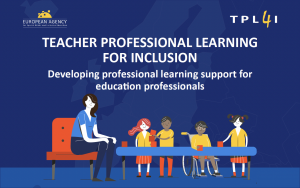This area contains multimedia materials including key messages, presentations and links to videos from the EASNIE YouTube channel.
Key Principles – Supporting policy development and implementation for inclusive education
Highlighting fundamental issues for education systems, the Key Principles series reflects the gradual shift in the Agency’s work over the past 25 years.
Infographic: Teacher Professional Learning for Inclusion

This three-page infographic was developed as part of the Teacher Professional Learning for Inclusion (TPL4I) activity. It explains the concept of teacher professional learning for inclusion and makes recommendations to implement it at different education system levels.
